After a two-year hiatus due to the coronavirus pandemic, the annual Conference of Presidents of Major American Jewish Organizations Mission to Israel kicks off Sunday in Jerusalem.
The umbrella group, which represents more than 50 Jewish communal groups spanning from the right to left flanks of American Jewish life, gets unprecedented access to Israel’s top leaders. Scheduled to speak at this year’s conference are Israeli Prime Minister Naftali Bennett; President Isaac Herzog; Foreign Minister and Alternate Prime Minister Yair Lapid; Defense Minister Benny Gantz; Justice Minister Gideon Sa’ar; opposition leader and former prime minister Benjamin Netanyahu; Israel Defense Forces Chief of Staff Lt. Gen. Aviv Kochavi; and U.S. Ambassador to Israel Thomas Nides.
He has long been viewed as the “unofficial president” of the American Jewish community. In that role, he has served as an interlocutor between Israeli and American government officials. He has also advanced Jewish and Israeli interests with foreign leaders across the Middle East, in Europe’s Eastern Mediterranean region and in Central Asia. In recent years, the Conference took its delegations to Greece, Cyprus, United Arab Emirates, Morocco, Egypt, Jordan and Saudi Arabia. Since the 1990s, one of Hoenlein’s main focuses has been to warm relations with the Gulf states. In 2020, those efforts clearly bore fruit with the signing of the historic Abraham Accords.
The accords likely would not have happened without years of building relations and trust away from public view. Over the years, kings, crown princes, presidents and other high-level government officials have relied on Hoenlein’s diplomatic prowess. Hoenlein maintains that he has always respected the confidential nature of visits and conversations; in return, world leaders gave singular access to Conference of Presidents’ delegations.
That role is the legacy built and nurtured by Hoenlein, who has sat at the head of major Jewish communal organizations for 50 years.
Daroff said he has known Hoenlein since 1996, working closely with him when Daroff was at Jewish Federations. In the past two years, said Daroff, “Malcom has become an amazing mentor, and someone who is committed to ensuring that the transition of leadership within the Conference is smooth and steady. Our transition process is, frankly, a model for the American Jewish world and leadership. A senior colleague, when reflecting on CEO transitions, told me that there are two laws of American Jewish leadership: despise your predecessor and despise your successor. Here, however, we are forging a new direction where that is absolutely not the case, and to discard and dismiss and not learn from his decades of experience would be malpractice for the Conference and for the American Jewish community.”
Hoenlein sat with JNS for an exclusive interview, which has been edited for clarity and brevity.
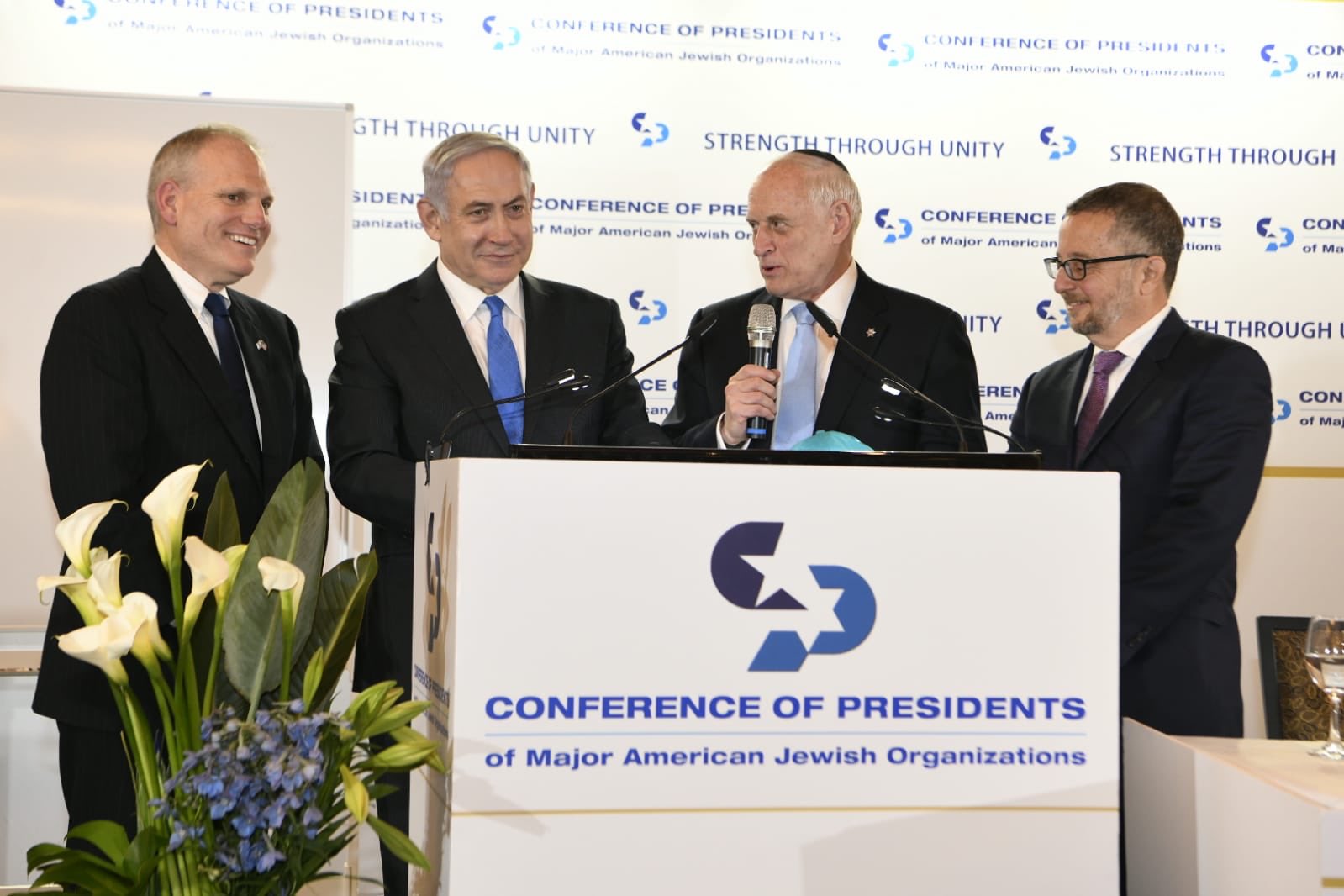
Q: How do you summarize 50 years at the head of some of American Jewry’s most impactful organizations? Have you accomplished what you set out to achieve? Is the Jewish community today in the position you hoped it would be?
A: I worked before that in Philadelphia, so it’s actually about 60 years that I’ve been involved as an activist.
I got involved in Soviet Jewry as a teenager in Philadelphia long before. We did the first big demonstrations outside of New York—and sometimes bigger than New York. And I organized the North American Union of Jewish Students and became vice chairman of the World Union of Jewish Students. I was the first youth and student vice chairman of the American Zionist movement when it was created, now the American Zionist Federation. I was involved on campus and with Hillel, and many other things.
We’ve lived through transitions from the post-Holocaust era and the Six-Day War, the Soviet Jewry movement. These were watersheds. The rescue of Russian Jews, Ethiopian Jews, Syrian Jews, Yemeni Jews; we’ve solved many of our crises. Part of the problem today is that you don’t have positive rallying issues for young people like we used to have. Today, I think that there are real challenges.
That’s a very good question, asking where I thought we would be. I’m not sure that I thought about 50 years ahead. I did think about what I wanted to do and the impact of that.
Q: How does the Conference of Presidents, among all the other Jewish groups out there, mobilize to address the challenges?
A: The Conference of Presidents remains the broadest umbrella of the Jewish community. I think it’s on the forefront. It’s done a great job in bringing together groups, fighting anti-Semitism, addressing challenges.
The conference is the common table where people can come together. The media always likes to tell what the differences are—to pit groups against each other. And the truth is that I’ve rarely seen where issues divide along the streams of left or right. It doesn’t divide that way, or very rarely, I should say. And I think that in many respects today, the conference is as important as ever.
Like on this mission, we have people from 53 organizations that will spend a week together. It builds ties; it breaks down some of the prejudices and some of the stereotypes. And we need everybody right now and every element of our community to stand together against common challenges. No organization can do it alone; we can only succeed by collectivizing our efforts.
Q: Much of your focus today is engaged in fighting anti-Semitism. There is a major uptick in violent anti-Semitism as well as softer forms of Jew-hatred. How has the situation become so dangerous for Jews living in the United States?
A: The anti-Semitism issue is much larger than people believe or want to believe. The number of incidents is skyrocketing. For a long time, people didn’t think of security as a priority. For a while, there was a focus—after the [October 2018] Pittsburgh Tree of Life synagogue shooting—but then it dissipated. And we can’t afford that. Jews need the rule of law. We need law and order to function and be secure as a community. When those things break down, we become victims.
We need to enhance the infrastructure of security in our communities, but we also have to demand that law enforcement and everybody else really go after anti-Semites. When there’s revolving-door justice, that a guy can commit three anti-Semitic attacks on synagogues in one morning and that afternoon is out and ready in another community, committing an attack, getting arrested again; this issue needs to be treated with the seriousness it requires. And no matter what the source, whether it’s extreme left, extreme right, black community, Muslims—it all has to be addressed. And we have to see that there are prosecutions.
I think that the situation on our campuses is very serious. And I think that you can’t distinguish between those who are fundamentally anti-Israel, who will carry the anti-Zionist message, and those who carry the anti-Semitic message. It morphs into one another.
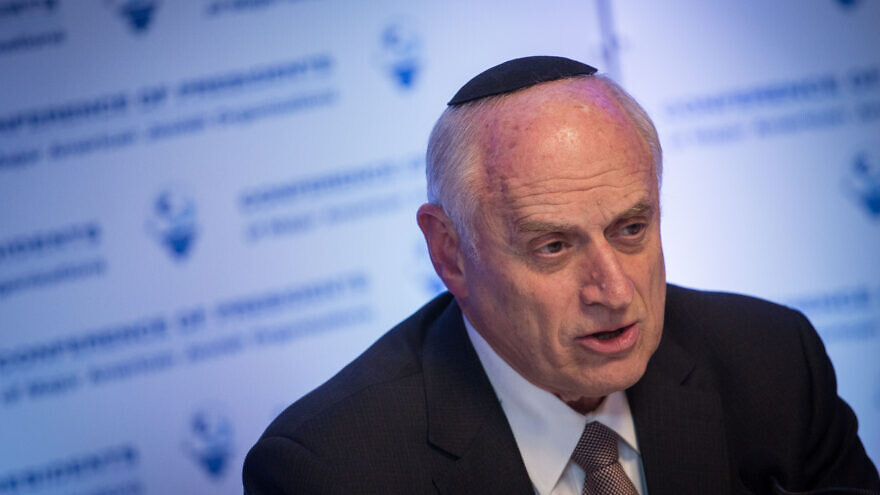
Q: For the American Jewish community, should the fight against anti-Semitism be looked at primarily as a local issue? How has hatred of the Jewish people spread so far and wide?
A: I always look at the British example as a forecast for where we’re going. There, we saw the breakdown of the left and right, and the loss of the political center. That’s where Jews basically find themselves and where we find comfort. The anti-Semitism was coming from the extremes, both from the left and the right. And when those extremes go far enough, they meet and they look identical.
In the United States, we’re starting to see the same themes emerging—the tattoos, the bandanas of the extreme Republicans, extreme Democrats, look alike. We’re losing the political center. Now we have members of Congress who openly espouse anti-Semitic points of view; people can get elected despite them. We saw this happen in England, and now we see it in America. But the effort against the Labour Party in Britain should be an inspiration for us and show what can be done.
So going after things like the Amnesty International report falsely accusing Israel of apartheid, these need to be priorities. Going after the Commission of Inquiry at the United Nations, which will only turn into an anti-Israel slam-fest with an unlimited budget and unlimited time. It’s very dangerous, and we have to do more to fight it. It’s like creating an international law firm just to bash Israel. The United States should cut 20 percent of its funding.
But the big change is the Internet. The Internet enables anti-Semitic messages to be spread in nanoseconds. And we see more and more that when people look for a scapegoat, they still turn to the Jews. They’re blaming COVID on the Jews.
It took Hitler months, if not years, to spread a big lie. Today, it’s done in nanoseconds. And you have state sponsors. You have such a proliferation of anti-Semitic sites and messaging. Even the mastering of the social-media networks to use them for anti-Semitic memes is unbelievable.
For a long time, we didn’t even know what was really happening; now we’re committing, coming to terms with reality. We have people working on the Internet, doing analysis of it, monitoring the dark web, identifying trends, looking for the sources.
Again, I think we’re in an early stage of mastering it. But that is a big change in terms of what we face. Anti-Semitism is always beneath the surface; you’re never going to eradicate it. But what you can do is force it back so that it doesn’t become acceptable.
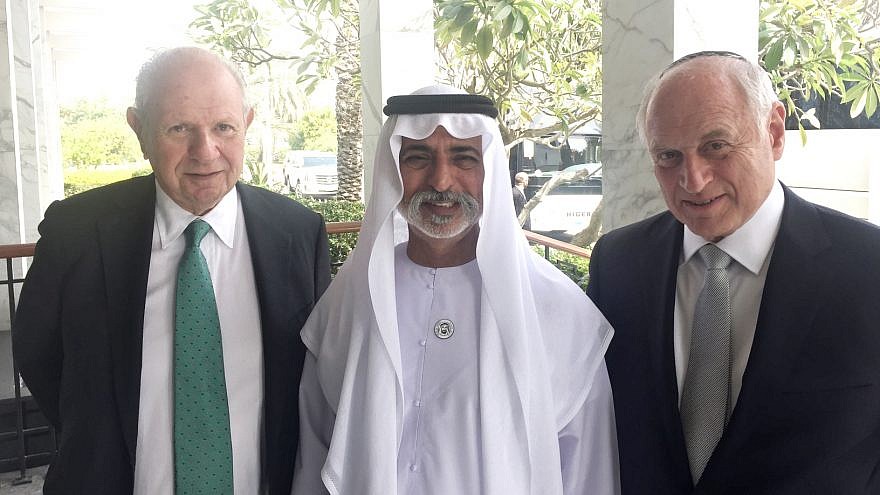
Q: You mentioned COVID. How has COVID impacted the Jewish community?
A: We’re an urban people; the vast majority of us live in the big cities. We live in integrated communities, by and large. And I think most people want to stay in the cities—the vibrancy, the culture and all the things valuable to it. Some 300,000 people left New York during COVID, and many of them were Jews. Will they come back? Can we reconstruct those communities? Will their synagogues survive? Will their communal institutions survive? We don’t know yet what the post-COVID implications will be.
Q: You’re painting a bleak picture. It sounds like the challenges are in many ways greater than ever before.
A: It’s not the worst time for American Jews, by far. In many respects, we’re in a very good place. You see that in the fact that IHRA [International Holocaust Remembrance Alliance working] definition of anti-Semitism is being adopted by governments, that more and more states have adopted anti-BDS laws. You see that Unilever could not ignore the pressures over the Ben & Jerry’s boycott of Judea and Samaria. A trillion-dollar company has lost $26 billion. That’s not chicken feed. A lot of it had to do with Ben & Jerry’s. When states start boycotting it, people start selling stock.
Now, I’m not going to tell you that that’s the sole reason for it. But the fact is that the message is very clear to other companies that if you engage in BDS, you could stand to suffer, and that state governments will act against you. So I think in many respects, governments are more responsive. Law enforcement is responsive. The national agencies—DHS, FBI others—are generally more responsive.
Q: What is the role that Israel plays, and do you think more American Jews will make aliyah to Israel?
A: Israel has become much more central in Jewish life, generally. It is the largest percentage of the Jewish population. And there’s a recognition that it’s no longer Israel the nebecher [“poor and weak”]. Today, Israel is a strong country. People come here to invest. Israel is a source of pride and inspiration for many people. I think the Abraham Accords have helped a lot. It raises Israel’s estimation because when their governments are saying, ‘Look how great Israel is’ … when the Arabs are making all these positive comments about Israel, I think it helps. It helps with young people. They appreciate it.
American Jews are insecure about the future of their communities and stuff. And they look at Israel—look at the birthrate in Israel. It’s amazing. The birthrate in America is anemic. I think many more Jews will consider moving to Israel, but I don’t want them to do it because of anti-Semitism. I want to do it for positive reasons. I want them to do it because they really appreciate Israel, and Israel will have a lot to offer them.
And for that, Israel also has to go through some changes in terms of how they welcome American Jews—how they are facilitating the process of citizenship, which is extremely difficult, everybody tells me.
Q: Over the past several years, some American Jewish leaders have been hypercritical of Israeli policies, and partially as a result, many young Jews are losing their connection to the Jewish state. Where does the American Jewish community stand today on Israel?
A: We have many other organizations, all of which have Israel as generally a core focus of their activity. And the spectrum may be wider, but I think that basically, American Jews remain supportive of Israel. The American organizational structure is. Certainly, it is as reflected in the Conference of Presidents. We have to do much more to make it exciting for the next generation to overcome the indifference. For many, it’s apathy much more than antagonism. But it turns to antagonism after a while.
That’s why we started the “America’s Voices” program, in order to bring people who could address young Jews, in particular, and young people overall. Like Hollywood actors, people who are credible to them, baseball stars, football stars. We bring them to Israel, and they go back and say, “I saw. This is no apartheid state. I had the greatest time of my life. You guys should only know how wonderful Israel is.”
Q: The organized Jewish community looks very different than it was when you started in Jewish communal leadership. What changes have you seen emerge over the past several years?
A: There have been major changes in the organizational structures, and I think there will be many more—in one sense, centralizing fundraising and other things. And on the other hand, decentralizing as more people donate through direct giving, wanting to see and control where their money goes. Many of the traditional organizations are going to go through transitions, as will the leadership. But many really important and wonderful people are now taking on leadership positions in the Jewish community. And I think many more will. And I regret to say it, but anti-Semitism might be a motivator. For a lot of young people who are distanced from the community, they’re looking for a tie to the community for protection. They feel vulnerable; therefore, they come back to work for the community.
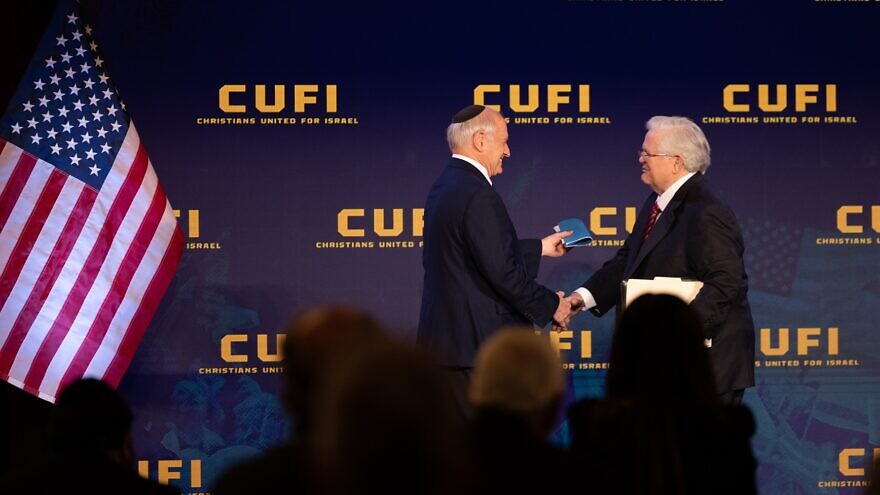
Q: Do you think that the Israeli government should count on the Biden administration to help protect its interest in the region?
A: Well, it depends on who defines the interests, but I think the administration is committed to Israel’s security. I think a lot of the key people are pro-Israel and have long histories of being pro-Israel. Biden, in particular; I’ve known him since 1968 when he was a freshman senator. I’ve seen him in difficult times for us, but he was a real mensch when he was vice president. I have had very confidential discussions with him. I know where he stands, where he stood on a lot of those issues at the time, that wasn’t necessarily the public perception. When he saw me at the White House Hanukkah party, he gave me a big hug. And it was on CNN.
But look, there are different perceptions about Israel’s security. Do they want to see the settlements grow? No. Would they do some of the things that the Trump administration did? Probably not. But on the fundamentals, they will be there. And the new Ambassador Tom Nides visited the Western Wall, went to the tunnels. He’s very influential within this administration. I’ve known Tom for many, many years. And I can tell you, when Hillary [Clinton] was U.S. secretary of state, it was Tom who delivered for us on a lot of the issues. He can be very tough, and he’s very blunt, and he’s very smart.
The fact is: America can be relied on.
Q: The administration remains adamant about re-entering an Iran nuclear deal that would lift sanctions on Iran, despite their malign behavior. What will it take to convince world leaders that a different approach needs to be taken?
A: On Iran, we’re certainly out there making the case and trying to get the elected officials to understand the seriousness of the issue. Negotiations with Iran are one-sided because they’re so clever at negotiations, and the West is so weak at it. They know how to manipulate and run around the situation. And they have the Russians working with them; they have the Chinese working with them. There’s no addressing of their regional mischief and support for terrorist groups.
Look at South America. We’re losing a whole continent, and nobody pays attention to it. Iran is infiltrating in Africa. Iran is fostering Shi’ite Muslim groups and other entities. Their goals are global hegemonic aspirations. The reaction to Iran has generally been weak. The people of Iran would support tougher sanctions. They’re tired of this government; they want it out. The drought has destroyed half the country. The people are piling into the cities because they can’t live in these rural, dried areas. There’s growing dissension. There were more than 6,000 demonstrations last year. And the West does nothing to support the people, to show them that we will stand with them.
The real change will come because of the people of Iran. They know what democracy is; they went demonstrating. They were yelling, “We will not die for Hamas! We will not die for Hezbollah! We will die for Iran!” I mean, what could be stronger as a message of where they stood? And they marched through the streets, 600,000, 700,000. And the West—the U.S. in particular—pulled the rug out from under the protesters. We abandoned them.
I think Israel has to continue to take the strongest possible stand because once Iran has the nuclear knowledge and the capacity. … Their big problem is they haven’t yet mastered weaponizing it, meaning taking a weapon and putting it in a form that you could put it on a warhead.
Q: With William Daroff running the Conference as CEO, you seem to be winding down your activities. But it looks like you still have a lot of energy. What comes next?
A: Well, I’ll continue working at the Conference; it’s one of my major initiatives. I’m also working with the Zuckerman Institute. We just built a new building here [in Israel]. I worked on the visitor center at the Kotel [Western Wall] and STEM [Science, Technology, Engineering and Math] programs and many other involvements in Israel. And I still work with the boards of many organizations—I’m the president of Jerusalem’s Great Synagogue; I’m president of Bridges of Gold.
But I have two big projects that I’m going to be working on. One will relate to anti-Semitism, and another I’m not ready to go public with but I hope that in the coming year, it will solidify. Another thing is I want to build on the Mediterranean initiative. I think that will change the map of the world. It takes Israel out of the Middle East and puts it in the Mediterranean.
One of the things I always believed is that it’s not important who gets the credit. It’s more about what you achieve. Thank God, I’ve been blessed with the opportunities. I never looked for a job in my life. Everything happened to me, and I think there was a trajectory. And I still have very great plans for the future.


























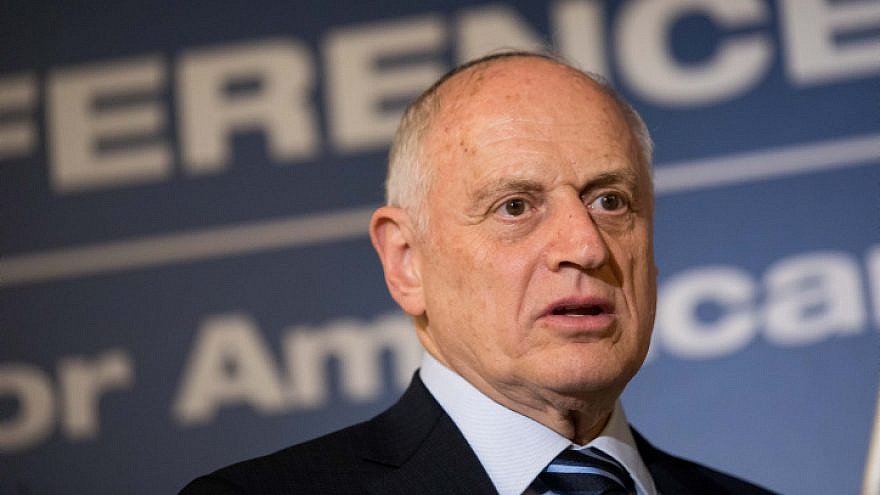
M. Friedman: Your comment is despicable. Though you disagree with someone, evil slander is inexcusable. You are speaking of someone who has spent his entire professional life in service of the Jewish community. Malcolm Honlein had the momentous task of bridging widely divergent interests and approaches for the common good of the community. I had the pleasure of being in contact with him after returning from the Soviet Union and as a speaker for the N.Y. Conference for Soviet Jewry.
Honlein is a fraud and Judenrat apologist! His covering up all o Joef Bidens anti Semitism is nauseating! Contrary to his lumping right wing with left wing so-called Jewish organizations the left are horrific Jewish in name only anti Semites!
If we lived in the Chanukah era, Malcolm Honlein would be an apologist for the excruciatuing oppressive Greek/Syrian Hellinist
occupation of Judea and he would be EXECUTED as were tens of thousands Jewish collabotors. The ORTHODOX Macabees executed both Greeks/Syrian Hellinists and the Mityavnim, the Jewish traitors.